|
|
|
Sort Order |
|
|
|
Items / Page
|
|
|
|
|
|
|
| Srl | Item |
| 1 |
ID:
131424
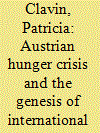

|
|
|
|
|
| Publication |
2014.
|
| Summary/Abstract |
From its foundation in 1918, the new Austrian republic was gripped by famine and a crisis of confidence in its currency that threatened to tip the new state into hyperinflation and revolution. This article shows how western efforts to aid Austria combat famine and its financial crisis were linked, and how they had a profound impact on the new League of Nations, the world's first multi-purpose intergovernmental organization. It also demonstrates the importance of the incipient wartime international bureaucracy for League agency. Contrary to the expectations of its architects, member governments, international financiers, businessmen and economists began to see the League as a useful tool to meet common needs that today would be called the search for human security. The article demonstrates how the Austrian food and financial crisis was the founding moment in the institutionalization of international economic and financial coordination, cooperation and oversight. It established the Economic and Financial Organization of the League of Nations, whose work would later inform its successors, the International Monetary Fund, the World Bank and the European Union. The study speaks to the ways in which the notion of security has broadened in the past two decades to embrace economic, social, political and environmental concerns. But the notion of 'human security' is not new; it was written into the body of the League.
|
|
|
|
|
|
|
|
|
|
|
|
|
|
|
|
| 2 |
ID:
133453


|
|
Big question: how much confidence do you have in your nation's banking system?
/ Lee, Ann; Pelagidis, Theodore; Fourie, Leila; Marques, Fernando, Ocampo, Jose Antonio, Antonini, Massimo, Naik, Prithvi, Britto, Neil
|

|
|
|
|
| Publication |
2014.
|
| Summary/Abstract |
The global banking system is the fundamental conduit of value within nations and across borders. Since the last global financial crisis, however, the role of banks as a repository of value has come increasingly into question. Today, with a fragile recovery in so much of the world, banks and those who manage and regulate them are under attack. We asked our panel of global experts how this crisis of confidence is playing out in their nation or region.
|
|
|
|
|
|
|
|
|
|
|
|
|
|
|
|
| 3 |
ID:
129029
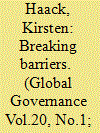

|
|
|
|
|
| Publication |
2014.
|
| Summary/Abstract |
The appointment of Christine Lagarde in 2011 to the leadership of the International Monetary Fund may have been a highlight for women's representation in international organizations, suggesting that the final glass ceiling for women in global governance has been broken. However, this article shows that leadership and representation by women in global governance continues to be curtailed by "glass walls" on the one hand, and flexible glass ceilings on the other. While women in UN agencies today stand on firmer floors, relying on a stronger institutional framework and increasing numbers of women working at all levels of the UN system, women are channeled into gender-specific portfolios, creating glass walls. Moreover, glass ceilings, once shattered, may indeed resettle as recent staff changes by Ban Ki-moon show. Thus, the picture of women's representation and gender equality in UN leadership is a mixed one.
|
|
|
|
|
|
|
|
|
|
|
|
|
|
|
|
| 4 |
ID:
133275
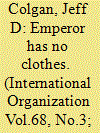

|
|
|
|
|
| Publication |
2014.
|
| Summary/Abstract |
Scholars have long debated the causal impact of international institutions such as the World Trade Organization or the International Monetary Fund. This study investigates Organization of Petroleum Exporting Countries (OPEC), an organization that purports to have significant influence over the market for the world's most important commodity-petroleum. Using four empirical tests, I find that OPEC has little or no impact on its members' production levels. These findings prompt the question of why so many people, including scholars, believe in OPEC's influence over the world's oil supply. The idea of OPEC as a cartel is a "rational myth" that supports the organization's true principal function, which is to generate political benefits for its members. One benefit it generates is international prestige. I test this idea using data on diplomatic representation and find that OPEC membership is associated with increased international recognition by other states. Overall, these findings help one to better understand international regimes and the process of ideational change in world politics.
|
|
|
|
|
|
|
|
|
|
|
|
|
|
|
|
| 5 |
ID:
133648
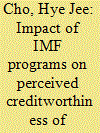

|
|
|
|
|
| Publication |
2014.
|
| Summary/Abstract |
This article examines whether the impact of International Monetary Fund (IMF) programs on the perceived creditworthiness of a country is conditional on government partisanship. Left-of-center governments tend to suffer from greater credibility problems in financial markets than right-wing governments, because they are typically believed to pursue expansionary policies and have less respect for debt obligations. Applying the conventional wisdom held as "Only Nixon can go to China," I argue that adopting IMF programs can benefit leftist governments more than other types of governments. The logic of the Nixon paradox implies that market-oriented reforms have greater credibility when implemented by a left-of-center party, whose ideologies do not accord well with the IMF's neoliberal policies, than when implemented by a right-wing party. This is because market participants interpret the action by a leftist government as driven more by a willingness to commit to market-oriented reform than by ideological affinity. Using sovereign credit rating data for almost 90 emerging market countries from 1980 to 2004, I find robust evidence consistent with the "Nixon-Goes-to-China" hypothesis. The findings suggest that adopting IMF programs improves the perceived creditworthiness of leftist governments, whereas no such benefit is found among non-leftist governments.
|
|
|
|
|
|
|
|
|
|
|
|
|
|
|
|
| 6 |
ID:
128190
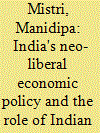

|
|
|
|
|
| Publication |
2014.
|
| Summary/Abstract |
Like other developing countries, India also faced a huge economic crisis during 90s. Basically, over the 80s there was a large and growing fiscal imbalance going on in the Indian economy and from mid 80s, India started facing problems related to balance of payments. Because of the Gulf war, India's export business decreased, oil import bill increased, credit dried up and investors were apprehensive about more investment. All these factors together led to a serious economic crisis during the end of 1990 and the government was close to default, foreign exchange reserves had been reduced and as a result, India had to airlift its gold reserves as a pledge in order to secure desperately needed international financing from international monetary fund (IMF). And, in this context, in order to secure its economy from financial crisis and to attract huge foreign direct investment (FDI), India had taken significant policy shifts in the beginning of the 90s. This new model of economic reforms is known as the neo liberal economic policy of India or LPG (liberalization, privatization and Globalization) model. The main objective of this model was to make the Indian economy as the fastest developing economy in the world which will be able to match up with the biggest economics of the world. Soon after, the government started introducing some new polices which include foreign technology agreements, foreign investment, deregulation, privatization, industrial licensing and abolition of license raj and, following the new liberal polices of India from Indian origin from different parts of the globe and overseas Indians stretched their hands with full of help to overcome this financial crisis in a number of ways. Starting from help in privatization, industrialization and foreign direct investment they have always supported their traditional homeland.
|
|
|
|
|
|
|
|
|
|
|
|
|
|
|
|
| 7 |
ID:
129051
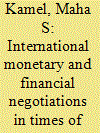

|
|
|
|
|
| Publication |
2014.
|
| Summary/Abstract |
The G20 leaders met for their third summit in Pittsburgh in September 2009. They agreed to institutionalize the G20 as the premier forum for their global economic cooperation, shift 5% of IMF quota shares and 3% of the World Bank's shares from the overrepresented advanced countries to underrepresented dynamic-markets and developing countries, and continue with their fiscal stimuli and measures to sustain a durable global economic recovery following the global recession of 2008/09. More importantly, they launched negotiations on global imbalances within a newly formed G20 mechanism; the Framework for Strong, Sustainable and Balanced Growth. This article focuses on the financial negotiations that took place in this summit, with the aim of explaining how the aforementioned outcome was reached. It focuses on actors' negotiating strategies as an intervening variable explaining the outcome, and compares the strategies of three important actors: the United States, China and Germany.
|
|
|
|
|
|
|
|
|
|
|
|
|
|
|
|
| 8 |
ID:
133278
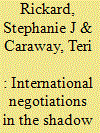

|
|
|
|
|
| Publication |
2014.
|
| Summary/Abstract |
This study examines the role elections play in negotiations between states and the International Monetary Fund (IMF). Although loans made by the IMF often require countries to introduce painful austerity measures that provoke a backlash from angry citizens, some governments are able to negotiate more favorable terms than others. Original data on the substantive content of IMF loans show that governments leverage imminent elections to obtain more lenient loan terms. Conditions that require labor market reforms in exchange for IMF financing are relatively less stringent in loans negotiated within six months before a pending democratic election, all else equal. The further away elections are from loan negotiations, the more stringent the labor conditions included in countries' loan programs. Elections give governments leverage in their international negotiations and this leverage is effective even when states negotiate with unelected bureaucrats during times of economic crisis.
|
|
|
|
|
|
|
|
|
|
|
|
|
|
|
|
| 9 |
ID:
124722
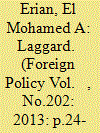

|
|
|
|
|
| Publication |
2013.
|
| Summary/Abstract |
AS THE WORLD'S power brokers--well, ministers and central bankers from 188 countries--gather in October for the annual meetings of the International Monetary Fund, they will again be confronted by evidence that the IMF is still in need of proper reform. This time, the evidence comes not only in the form of continued global economic malaise and financial instability, but the IMF'S brutally honest self-evaluation of its role in the insufficient Greek bailout (and, by implication, its involvement in other European countries). On the heels of this disappointing performance, one thing is clear: The IMF is still stuck in the last century
|
|
|
|
|
|
|
|
|
|
|
|
|
|
|
|
| 10 |
ID:
131496
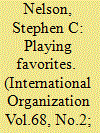

|
|
|
|
|
| Publication |
2014.
|
| Summary/Abstract |
International organizations (IOs) suffuse world politics, but the International Monetary Fund (IMF) stands out as an unusually important IO. My research suggests that IMF lending is systematically biased. Preferential treatment is largely driven by the degree of similarity between beliefs held by IMF officials and key economic policy-makers in the borrowing country. This article describes the IMF's ideational culture as "neoliberal," and assumes it to be stable during the observation window (1980-2000). The beliefs of top economic policy-makers in borrowing countries, however, vary in terms of their distance from IMF officials' beliefs. When fellow neoliberals control the top economic policy posts the distance between the means of the policy team's beliefs and the IMF narrows; consequently, IMF loans become less onerous, more generous, and less rigorously enforced. I gathered data on the number of conditions and the relative size of loans for 486 programs in the years between 1980 and 2000. I collected data on waivers, which allow countries that have missed binding conditions to continue to access funds, as an indicator for enforcement. I rely on indirect indicators, gleaned from a new data set that contains biographical details of more than 2,000 policy-makers in ninety developing countries, to construct a measure of the proportion of the top policy officials that are fellow neoliberals. The evidence from a battery of statistical tests reveals that as the proportion of neoliberals in the borrowing government increases, IMF deals get comparatively sweeter.
|
|
|
|
|
|
|
|
|
|
|
|
|
|
|
|
| 11 |
ID:
127789
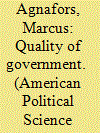

|
|
|
|
|
| Publication |
2013.
|
| Summary/Abstract |
Concepts such as "quality of government" and "good governance" refer to a desired character of the exercise of public authority. Recently the interest in good governance, the quality of government, and similar concepts has increased considerably. However, despite this increasing interest and use, an adequate definition of the concept of quality of government has proved difficult to find. This article criticizes recent attempts at such a definition and proposes an alternative, more complex definition that includes moral content and also encompasses a plurality of values and virtues at its core. An acceptable definition of the quality of governance must be consistent with the demands of a public ethos, the virtues of good decision making and reason giving, the rule of law, efficiency, stability, and a principle of beneficence. The article describes these components in detail and the relations among them.
|
|
|
|
|
|
|
|
|
|
|
|
|
|
|
|
| 12 |
ID:
132127
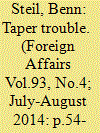

|
|
|
|
|
| Publication |
2014.
|
| Summary/Abstract |
In April 2013, Ukraine was sporting a massive current account deficit of eight percent, and it badly needed dollars to pay for vital imports. Yet on April 10, President Viktor Yanukovych's government rejected terms set by the International Monetary Fund (IMF) for a $15 billion financial assistance package, choosing instead to continue financing the gap between its domestic production and its much higher consumption by borrowing dollars privately from abroad. So a week later, Kiev issued a ten-year, $1.25 billion eurobond, which cash-flush foreign investors gobbled up at a 7.5 percent yield.
|
|
|
|
|
|
|
|
|
|
|
|
|
|
|
|
|
|
|
|
|